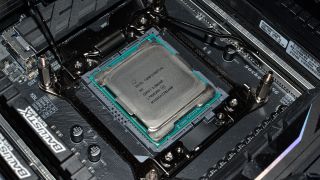Here's why 10-core processors like the new Skylake-X are still totally overkill for gaming
Skylake-X is here, Threadripper is coming, but gamers should give both a pass.

The most important part of any gaming PC is the graphics card. Since the advent of the GPU in the late 90s, this is the one fact PC gamers can count on, and with 8-core, 10-core, and even 18-core CPUs on the horizon (or horyzen if you prefer), it's important to keep this in mind. I've been testing (and retesting) CPUs for most of the past two weeks, getting ready for Intel's Skylake-X and Kaby Lake-X launch. I'm still not ready with all the numbers I want to show, but if you're mostly worried about gaming, I can help:
Forget about the new CPUs.
And forget about core count. Okay, don't go completely bonkers and assume all you need is a dual-core processor from several years ago, but for modern PC games, even with a GTX 1080 Ti graphics card, there's typically very little difference between a $200-$250 CPU and a $500-$1000 CPU. And where there is some difference, it's often only if you bend over backwards to concoct an unusual gaming scenario, using settings that you wouldn't normally run on a GTX 1080 Ti.
All my CPU game performance tests are done at 1080p with maxed out settings, as a compromise between putting the load almost completely on the GPU (1440p ultra and above), and putting the load on the CPU and other elements (1080p medium). But the type of gamer who goes out and buys a GTX 1080 Ti is precisely the sort of person who is likely to buy a 1440p or 4K monitor. And if you have a nice monitor, you don't want to ruin it by running at 1080p.
So what can I tell you about gaming performance right now? Try this on for size: in the sixteen games I tested (charts will be coming later this week, along with a full review of Core i9-7900X and Core i7-7740X), there is only one game where the 10-core/20-thread CPU beats the 4-core/8-thread CPU—and not by a large margin. On the other hand, there are two games where the 4-core/8-thread part delivers a noteworthy victory.
In other words, the two chips are basically tied for gaming performance. The difference? One costs $325, and the other costs $999.
But we can take that a step further. Looking at the mainstream i5-7600K that we continue to recommend as the best gaming CPU, there are three games where the additional cores prove beneficial, and two games where the 4-core part still maintains a lead. Overall, at stock clocks, the $999 CPU is only seven percent faster in gaming workloads—and again, that's with a GTX 1080 Ti, where there's absolutely no GPU bottleneck; a GTX 1070 would show almost no difference. Overclock both chips and things shift slightly more in favor of the i5-7600K, though the i7-7700K overclocked still reigns as the fastest overclocked CPU for gaming purposes.
The biggest gaming news, reviews and hardware deals
Keep up to date with the most important stories and the best deals, as picked by the PC Gamer team.
The decision is simple. If you only want to play games and you want the best bang for the buck, get the i5-7600K—and overclock it to 4.8GHz if that's something you like to do. Either way, for everything from a GTX 1050 through a GTX 1080 Ti, you'll get a great gaming experience.
But if you do more than just gaming, like running multiple browser tabs, several gaming services, and even doing a Twitch encode (on the GPU) in the background? Okay, go a bit higher and buy a Ryzen 5 1600, or an i7-7700K, or—maybe—even a Ryzen 7 1700 or the new i7-7800X. Anything more than that and you're just chasing bragging rights.
Jarred's love of computers dates back to the dark ages when his dad brought home a DOS 2.3 PC and he left his C-64 behind. He eventually built his first custom PC in 1990 with a 286 12MHz, only to discover it was already woefully outdated when Wing Commander was released a few months later. He holds a BS in Computer Science from Brigham Young University and has been working as a tech journalist since 2004, writing for AnandTech, Maximum PC, and PC Gamer. From the first S3 Virge '3D decelerators' to today's GPUs, Jarred keeps up with all the latest graphics trends and is the one to ask about game performance.
Most Popular

